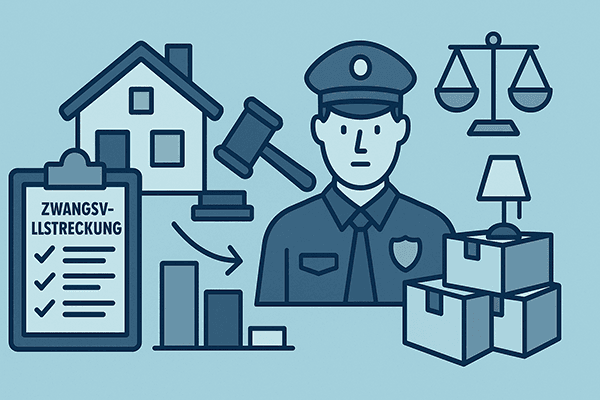Nice to have you here
at WG-Gesucht.de!
at WG-Gesucht.de!
Select Credit Report
Please choose a provider for your credit report.
 During enforcement, it’s not just ownership but possession that matters — tenants who can prove what’s theirs protect themselves from wrongful seizure.
During enforcement, it’s not just ownership but possession that matters — tenants who can prove what’s theirs protect themselves from wrongful seizure.
Enforcement occurs when a creditor uses the court system to collect outstanding debts from a debtor.
In rental apartments, this often means a bailiff may visit to seize items belonging to the debtor. The goal is to sell these possessions to satisfy the creditor’s claim.
For tenants, it’s important to know: the bailiff may only enter the debtor’s residence and may seize only items over which the debtor has actual possession (known as “Gewahrsam” in German law).
A bailiff can seize movable property that belongs to the debtor and has economic value. Examples include:
However, certain items are exempt from seizure, such as:
If the bailiff seizes items that should be exempt, the debtor or rightful owner may object and request their release.
During enforcement, the bailiff doesn’t automatically verify ownership but rather checks who has possession or control of the property.
That’s why it’s crucial to prove ownership when other people live in the same household or when the ownership of items is unclear.
Tenants should clearly indicate which rooms belong to them and which belongings are theirs. This is especially relevant in shared housing or family situations where multiple people use common areas.
Keep purchase receipts, invoices, or sworn statements to document ownership and avoid wrongful seizure.
If a bailiff seizes items that belong to someone else, the rightful owner must contact the creditor in writing and demand the item’s release.
Attach proof of ownership such as invoices, payment confirmations, or bank statements.
If the creditor refuses to release the item, the owner may file a third-party objection claim (“Drittwiderspruchsklage,” § 771 ZPO) with the local court.
This allows the court to officially confirm that the seized property does not belong to the debtor and must therefore be exempt from sale.
In shared apartments (WGs), enforcement can be particularly complicated. Since multiple people live together, it’s often unclear who owns which items.
If valuable objects (like a TV or stereo) are located in shared spaces, the bailiff assumes joint possession (“Mitgewahrsam”). In such cases, these items cannot be seized, as ownership cannot be clearly attributed to the debtor.
To prevent wrongful seizure, residents should immediately inform the bailiff which room belongs to the debtor.
If other roommates’ belongings are seized, they should prove ownership in writing and request release from the creditor.
Good documentation and transparent communication help tenants avoid problems and protect their property during enforcement.
Only with a court order and only if the debtor actually lives there. Other tenants’ homes cannot be entered without consent.
Immediately contact the creditor in writing, provide proof of ownership, and request release. If they refuse, you can file a third-party objection claim.
Keep proof of ownership, document valuable possessions, and clearly define who owns what in shared or family households.